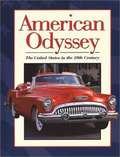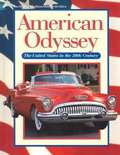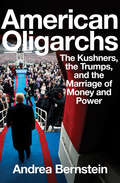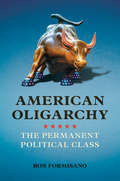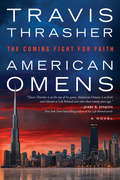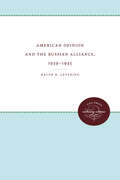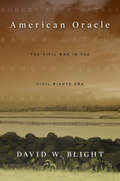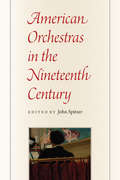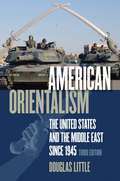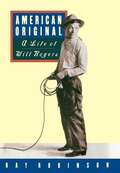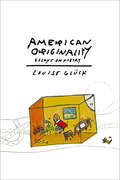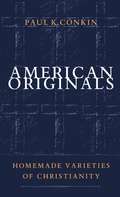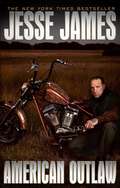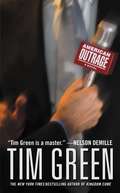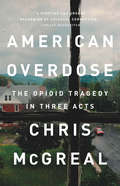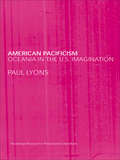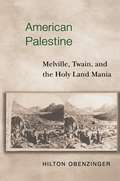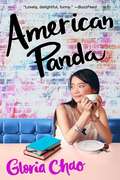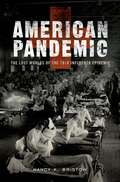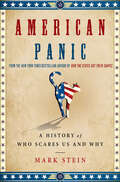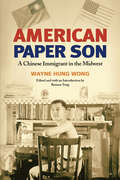- Table View
- List View
American Odyssey: The United States In The 20th Century
by Gary B. NashThe Americas had long been the home to a rich variety of Native American cultures. Hundreds of years ago, however, other peoples-- Europeans and enslaved Africans--set foot in what was to them a new world. Together they created the United States of America--a nation founded on the promise of liberty and equality for all the diverse people who have contributed to its success.
American Odyssey: The United States in the 20th Century
by Gary B. NashA history of the United States in the twentieth century, featuring sociological and cultural events, as well as strictly historical, and using many pertinent literary excerpts.
American Odyssey: The United States in the 20th Century
by Gary B. NashA history of the United States in the twentieth century, featuring sociological and cultural events, as well as strictly historical, and using many pertinent literary excerpts.
American Odyssey: The United States in the Twentieth Century
by Gary B. NashA history of the United States in the twentieth century, featuring sociological and cultural events, as well as strictly historical, and using many pertinent literary excerpts.
American Oligarchs: The Kushners, The Trumps, And The Marriage Of Money And Power
by Andrea BernsteinA multigenerational saga of two families, who rose from immigrant roots to the pinnacle of wealth and power, that tracks the unraveling of American democracy. <P><P>In American Oligarchs, award-winning investigative journalist Andrea Bernstein tells the story of the Trump and Kushner families like never before. Their journey to the White House is a story of survival and loss, crime and betrayal, that stretches from the Klondike Gold Rush, through Nazi-occupied Poland and across the American Century, to our new gilded age. In building and maintaining their dynastic wealth, these families came to embody the rising nationalism and inequality that has pushed the United States to the brink of oligarchy. <P><P>Building on her landmark reporting for the acclaimed podcast Trump, Inc. and The New Yorker, Bernstein’s painstaking detective work brings to light new information about the families’ arrival as immigrants to America, their paths to success, and the business and personal lives of the president and his closest family members. <P><P>Bernstein traces how the two families ruthlessly harnessed New York and New Jersey machine politics to gain valuable tax breaks and grew rich on federal programs that bolstered the middle class. She shows how the Trump Organization, denied credit by American banks, turned to shady international capital. She reveals astonishing new details about Charles Kushner’s attempts to ensnare his brother-in-law with a prostitute and explores how Jared Kushner and his father used a venerable New York newspaper to bolster their business empire. <P><P>Drawing on more than two hundred interviews and more than one hundred thousand pages of documents, many previously unseen or long forgotten, Bernstein shows how the Trumps and the Kushners repeatedly broke rules and then leveraged secrecy, intimidation, and prosecutorial and judicial power to avoid legal consequences. <P><P>The result is a compelling narrative that details how the Trump and Kushner dynasties encouraged and profited from a system of corruption, dark money, and influence trading, and that reveals the historical turning points and decisions—on taxation, regulation, white-collar crime, and campaign finance laws—that have brought us to where we are today. <P><P><b>A New York Times Bestseller</b>
American Oligarchy: The Permanent Political Class
by Ron FormisanoA permanent political class has emerged on a scale unprecedented in our nation 's history. Its self-dealing, nepotism, and corruption contribute to rising inequality. Its reach extends from the governing elite throughout nongovernmental institutions. Aside from constituting an oligarchy of prestige and power, it enables the creation of an aristocracy of massive inherited wealth that is accumulating immense political power. In a muckraking tour de force reminiscent of Lincoln Steffens, Upton Sinclair, and C. Wright Mills, American Oligarchy demonstrates the way the corrupt culture of the permanent political class extends down to the state and local level. Ron Formisano breaks down the ways this class creates economic inequality and how its own endemic corruption infects our entire society. Formisano delves into the work of not just politicians but lobbyists, consultants, appointed bureaucrats, pollsters, celebrity journalists, behind-the-scenes billionaires, and others. Their shameless pursuit of wealth and self-aggrandizement, often at taxpayer expense, rewards channeling the flow of income and wealth to elites. That inequality in turn has choked off social mobility and made a joke of meritocracy. As Formisano shows, these forces respond to the oligarchy 's power and compete to bask in the presence of the .01 percent. They also exacerbate the dangerous instability of an American democracy divided between extreme wealth and extreme poverty.
American Omens: The Coming Fight for Faith: A Novel
by Travis ThrasherIn this taut thriller that depicts a future where belief is dangerous, faith is deemed hatred, and a group of powerful elite keeps watch, the Reckoner has come to wake up America.The year is 2038 and Cheyenne Burne is a brilliant young programmer working for Acatour, the world's top technology firm. Her father converts to Christianity, and he suddenly disappears without a trace. When a stranger hands Cheyenne a coded message that sends her on a collision course with a clandestine group of believers, she must put her life in the hands of those following a man known only as the Reckoner. He claims he wants to bring back true faith in Christ to America and also reveal the forces behind the disappearances of the many renowned people who publicly declared their Christian faith. Operating in the shadows and living off the grid, this mysterious prophet assembles a ragtag team--including a former bookseller whose store was shut down for selling prohibited books--to help him take the battle for transparency to the top. With a ruthless FBI agent closing in, can Cheyenne and the others expose the truth and lead a return to God in America before it's too late?
American Opinion and the Russian Alliance, 1939-1945
by Ralph B. LeveringIn this analysis of the years of greatest American friendship with the Soviet Union, Levering comes to two conclusions. First, cosmopolitan, educated Americans of all classes were much more likely to change their negative attitudes of 1939 to positive ones by 1943 than were the provincial and poorly educated. Second, governmental leaders and the media, whether conservative or liberal, did not prepare the public for the probable realities of postwar international politics.Originally published in 1976.A UNC Press Enduring Edition -- UNC Press Enduring Editions use the latest in digital technology to make available again books from our distinguished backlist that were previously out of print. These editions are published unaltered from the original, and are presented in affordable paperback formats, bringing readers both historical and cultural value.
American Oracle: The Civil War in the Civil Rights Era
by David W. Blight“The ghosts of the Civil War never leave us, as David Blight knows perhaps better than anyone, and in this superb book he masterfully unites two distant but inextricably bound events.”―Ken Burns Standing on the steps of the Lincoln Memorial on August 28, 1963, a century after the signing of the Emancipation Proclamation, Martin Luther King, Jr., declared, “One hundred years later, the Negro still is not free.” He delivered this speech just three years after the Virginia Civil War Commission published a guide proclaiming that “the Centennial is no time for finding fault or placing blame or fighting the issues all over again.” David Blight takes his readers back to the centennial celebration to determine how Americans then made sense of the suffering, loss, and liberation that had wracked the United States a century earlier. Amid cold war politics and civil rights protest, four of America’s most incisive writers explored the gulf between remembrance and reality. Robert Penn Warren, the southern-reared poet-novelist who recanted his support of segregation; Bruce Catton, the journalist and U.S. Navy officer who became a popular Civil War historian; Edmund Wilson, the century’s preeminent literary critic; and James Baldwin, the searing African-American essayist and activist—each exposed America’s triumphalist memory of the war. And each, in his own way, demanded a reckoning with the tragic consequences it spawned. Blight illuminates not only mid-twentieth-century America’s sense of itself but also the dynamic, ever-changing nature of Civil War memory. On the eve of the 150th anniversary of the war, we have an invaluable perspective on how this conflict continues to shape the country’s political debates, national identity, and sense of purpose.
American Orchestras in the Nineteenth Century
by John SpitzerStudies of concert life in nineteenth-century America have generally been limited to large orchestras and the programs we are familiar with today. But as this book reveals, audiences of that era enjoyed far more diverse musical experiences than this focus would suggest. To hear an orchestra, people were more likely to head to a beer garden, restaurant, or summer resort than to a concert hall. And what they heard weren't just symphonic works--programs also included opera excerpts and arrangements, instrumental showpieces, comic numbers, and medleys of patriotic tunes. This book brings together musicologists and historians to investigate the many orchestras and programs that developed in nineteenth-century America. In addition to reflecting on the music that orchestras played and the socioeconomic aspects of building and maintaining orchestras, the book considers a wide range of topics, including audiences, entrepreneurs, concert arrangements, tours, and musicians' unions. The authors also show that the period saw a massive influx of immigrant performers, the increasing ability of orchestras to travel across the nation, and the rising influence of women as listeners, patrons, and players. Painting a rich and detailed picture of nineteenth-century concert life, this collection will greatly broaden our understanding of America's musical history.
American Orchestras in the Nineteenth Century
by John SpitzerStudies of concert life in nineteenth-century America have generally been limited to large orchestras and the programs we are familiar with today. But as this book reveals, audiences of that era enjoyed far more diverse musical experiences than this focus would suggest. To hear an orchestra, people were more likely to head to a beer garden, restaurant, or summer resort than to a concert hall. And what they heard weren’t just symphonic works—programs also included opera excerpts and arrangements, instrumental showpieces, comic numbers, and medleys of patriotic tunes.This book brings together musicologists and historians to investigate the many orchestras and programs that developed in nineteenth-century America. In addition to reflecting on the music that orchestras played and the socioeconomic aspects of building and maintaining orchestras, the book considers a wide range of topics, including audiences, entrepreneurs, concert arrangements, tours, and musicians’ unions. The authors also show that the period saw a massive influx of immigrant performers, the increasing ability of orchestras to travel across the nation, and the rising influence of women as listeners, patrons, and players. Painting a rich and detailed picture of nineteenth-century concert life, this collection will greatly broaden our understanding of America’s musical history.
American Orientalism
by Douglas LittleDouglas Little explores the stormy American relationship with the Middle East from World War II through the war in Iraq, focusing particularly on the complex and often inconsistent attitudes and interests that helped put the United States on a collision course with radical Islam early in the new millennium. After documenting the persistence of "orientalist" stereotypes in American popular culture, Little examines oil, Israel, and other aspects of U.S. policy. He concludes that a peculiar blend of arrogance and ignorance has led American officials to overestimate their ability to shape events in the Middle East from 1945 through the present day, and that it has been a driving force behind the Iraq war. For this updated third edition, Little covers events through 2007, including a new chapter on the Bush Doctrine, demonstrating that in many important ways, George W. Bush's Middle Eastern policies mark a sharp break with the past.
American Original: A Life Of Will Rogers
by Ray RobinsonA biography of Will Rogers, an early twentieth century humorist, newspaper columnist, actor in silent movies and then talkies and a spectacular lariat performer, who was very proud of his one-quarter Cherokee ancestry. Definitely an American original because of the combination of his folksy language and wry humor.
American Originality: Essays on Poetry
by Louise GlückA luminous collection of essays from one of our most original and influential poets Five decades after her debut poetry collection, Firstborn, Louise Glück is a towering figure in American letters. Written with the same probing, analytic control that has long distinguished her poetry, American Originality is Glück’s second book of essays—her first, Proofs and Theories, won the 1993 PEN/Martha Albrand Award for First Nonfiction. Glück’s moving and disabusing lyricism is on full display in this decisive new collection. From its opening pages, American Originality forces readers to consider contemporary poetry and its demigods in radical, unconsoling, and ultimately very productive ways. Determined to wrest ample, often contradictory meaning from our current literary discourse, Glück comprehends and destabilizes notions of “narcissism” and “genius” that are unique to the American literary climate. This includes erudite analyses of the poets who have interested her throughout her own career, such as Rilke, Pinsky, Chiasson, and Dobyns, and introductions to the first books of poets like Dana Levin, Peter Streckfus, Spencer Reece, and Richard Siken. Forceful, revealing, challenging, and instructive, American Originality is a seminal critical achievement.
American Originals
by Paul K. ConkinIn a work of striking breadth and clarity, Paul Conkin offers an even-handed and in-depth look at the major American-made forms of Christianity--a diverse group of religious traditions, each of which reflects a significant break from western Christian orthodoxy. Identifying six distinctive types, Conkin examines the major denominations representative of each original variety of American Christianity: restoration (Churches of Christ, Disciples of Christ); humanistic (Unitarians, Universalists); apocalyptic (Adventists, Jehovah's Witnesses); Mormon (Church of Jesus Christ of Latter-day Saints); spiritual (Christian Science, Unity); and ecstatic (Holiness and Pentecostal denominations). Focusing on the early years and maturation of these groups, he discusses their founders and leaders, origins and Old World roots, and essential doctrines and practices. Conkin closes each chapter with a guide to further reading. The first comprehensive survey of these American originals, this book will serve as a valuable resource on a number of religious traditions whose members not only comprise a significant percentage of the American population but also make up an increasing proportion of Christian converts worldwide.
American Outlaw
by Jesse JamesThe New York Times bestselling self-portrait of a flawed but determined everyman: rebel, outlaw, gearhead, artist, entrepreneur, lost son, and fiercely committed father Jesse James is everything you imagined him to be-- and more than you ever expected. He has led a violent life. He's survived lower depths, faced harder times, and beaten down more private demons than most--and lived to tell his story with honesty, introspection, and humility. He's tough as nails and riding hard through life, with plenty of wisdom to share about taking a hit and coming back up. In American Outlaw, Jesse reveals all: from his volatile upbringing and troubled relationship with his father to his wild days of car thieving and juvenile detention; from knocking heads as a rock 'n' roll bodyguard to his destructive drinking and barroom brawling; from building an empire from the ground up to marriages marked with both happiness and gut-wrenching pain; from living inside the hottest level of paparazzi hell to rehab and making peace with his past.
American Outrage
by Tim GreenJake Carlson, a correspondent for the TV news show AMERICAN OUTRAGE, inhabits a world of sensational trials and crazed celebrities. One of the nation's top journalists, he's used to dragging himself into the dirt to get the truth. When his adopted son Sam asks him to use his muckraking talents to find his birth mother, Jake is stunned by the ugly secrets he uncovers: an international crime syndicate, a horrifying child trafficking ring, and a corrupt politician, the patriarch of an old New York financial dynasty. Initially galvanized by a career-making story, Jake---and his son---are soon the victims of brutal violence and the targets of Jake's fellow reporters, who dog them for their story. Concerned for the survival of his family, Jake realizes some sins of the past should never be uncovered...
American Outsourcing
by Richard H.K. Vietor Alexander VeytsmanCovers the phenomenon of outsourcing jobs from the United States. Reviews the evolution of Mexico's Maquiladoras, manufacturing special economic areas in China, and information technology and service-sourcing in India. Also reviews exports/imports, exchange rates, wages, and jobs. Considers major outsourcer General Electric's moves to these countries and its plans. Compares Mexico and China, and India and China, asking what the United States and GE should be doing.
American Overdose: The Opioid Tragedy in Three Acts
by Chris McGrealA comprehensive portrait of a uniquely American epidemic--devastating in its findings and damning in its conclusionsThe opioid epidemic has been described as "one of the greatest mistakes of modern medicine." But calling it a mistake is a generous rewriting of the history of greed, corruption, and indifference that pushed the US into consuming more than 80 percent of the world's opioid painkillers.Journeying through lives and communities wrecked by the epidemic, Chris McGreal reveals not only how Big Pharma hooked Americans on powerfully addictive drugs, but the corrupting of medicine and public institutions that let the opioid makers get away with it.The starting point for McGreal's deeply reported investigation is the miners promised that opioid painkillers would restore their wrecked bodies, but who became targets of "drug dealers in white coats."A few heroic physicians warned of impending disaster. But American Overdose exposes the powerful forces they were up against, including the pharmaceutical industry's coopting of the Food and Drug Administration and Congress in the drive to push painkillers--resulting in the resurgence of heroin cartels in the American heartland. McGreal tells the story, in terms both broad and intimate, of people hit by a catastrophe they never saw coming. Years in the making, its ruinous consequences will stretch years into the future.
American Pacificism: Oceania in the U.S. Imagination (Routledge Research in Postcolonial Literatures)
by Paul LyonsThis provocative analysis and critique of American representations of Oceania and Oceanians from the nineteenth century to the present, argues that imperial fantasies have glossed over a complex, violent history. It introduces the concept of ‘American Pacificism’, a theoretical framework that draws on contemporary theories of friendship, hospitality and tourism to refigure established debates around ‘orientalism’ for an Oceanian context. Paul Lyons explores American-Islander relations and traces the ways in which two fundamental conceptions of Oceania have been entwined in the American imagination. On the one hand, the Pacific islands are seen as economic and geopolitical ‘stepping stones’, rather than ends in themselves, whilst on the other they are viewed as ends of the earth or ‘cultural limits’, unencumbered by notions of sin, antitheses to the industrial worlds of economic and political modernity. However, both conceptions obscure not only Islander cultures, but also innovative responses to incursion. The islands instead emerge in relation to American national identity, as places for scientific discovery, soul-saving and civilizing missions, manhood-testing adventure, nuclear testing and eroticized furloughs between maritime work and warfare. Ranging from first contact and the colonial archive through to postcolonialism and global tourism, this thought-provoking volume draws upon a wide, rewarding collection of literary works, historical and cultural scholarship, government documents and tourist literature.
American Palestine: Melville, Twain, and the Holy Land Mania
by Hilton ObenzingerIn the nineteenth century, American tourists, scholars, evangelists, writers, and artists flocked to Palestine as part of a "Holy Land mania." Many saw America as a New Israel, a modern nation chosen to do God's work on Earth, and produced a rich variety of inspirational art and literature about their travels in the original promised land, which was then part of Ottoman-controlled Palestine. In American Palestine, Hilton Obenzinger explores two "infidel texts" in this tradition: Herman Melville's Clarel: A Poem and Pilgrimage to the Holy Land (1876) and Mark Twain's The Innocents Abroad: or, The New Pilgrims' Progress (1869). As he shows, these works undermined in very different ways conventional assumptions about America's divine mission. In the darkly philosophical Clarel, Melville found echoes of Palestine's apparent desolation and ruin in his own spiritual doubts and in America's materialism and corruption. Twain's satiric travelogue, by contrast, mocked the romantic naiveté of Americans abroad, noting the incongruity of a "fantastic mob" of "Yanks" in the Holy Land and contrasting their exalted notions of Palestine with its prosaic reality. Obenzinger demonstrates, however, that Melville and Twain nevertheless shared many colonialist and orientalist assumptions of the day, revealed most clearly in their ideas about Arabs, Jews, and Native Americans. Combining keen literary and historical insights and careful attention to the context of other American writings about Palestine, this book throws new light on the construction of American identity in the nineteenth century.
American Panda
by Gloria Chao&“Weepingly funny.&” —The Wall Street Journal &“Delightful.&” —BuzzFeed &“Charmed my socks off.&” —David Arnold, New York Times bestselling author of Kids of Appetite and Mosquitoland Four starred reviews for this incisive, laugh-out-loud contemporary debut about a Taiwanese American teen whose parents want her to be a doctor and marry a Taiwanese Ivy Leaguer despite her squeamishness with germs and crush on a Japanese classmate.At seventeen, Mei should be in high school, but skipping fourth grade was part of her parents&’ master plan. Now a freshman at MIT, she is on track to fulfill the rest of this predetermined future: become a doctor, marry a preapproved Taiwanese Ivy Leaguer, produce a litter of babies. With everything her parents have sacrificed to make her cushy life a reality, Mei can&’t bring herself to tell them the truth—that she (1) hates germs, (2) falls asleep in biology lectures, and (3) has a crush on her classmate Darren Takahashi, who is decidedly not Taiwanese. But when Mei reconnects with her brother, Xing, who is estranged from the family for dating the wrong woman, Mei starts to wonder if all the secrets are truly worth it. Can she find a way to be herself, whoever that is, before her web of lies unravels? From debut author Gloria Chao comes a hilarious, heartfelt tale of how, unlike the panda, life isn&’t always so black and white.
American Pandemic: The Lost Worlds of the 1918 Influenza Epidemic
by Nancy K. BristowThis readable and compelling account explains the role of race, gender and class, promotion of physical fitness and public education, and America's public health strategy during the influenza epidemics in 1918, 1919, 1920, and 1922. Bristow's work distinguishes itself with her emphasis on influenza epidemics beyond 1918-1919, the roles of physicians and nurses, the importance of public health nursing, and the personal revelation that she lost great-grandparents due to influenza.
American Panic: A History of Who Scares Us and Why
by Mark SteinIn American Panic , New York Times bestselling author Mark Stein traces the history and consequences of American political panics through the years. Virtually every American, on one level or another, falls victim to the hype, intensity, and propaganda that accompanies political panic, regardless of their own personal affiliations. By highlighting the similarities between American political panics from the Salem witch hunt to present-day vehemence over issues such as Latino immigration, gay marriage, and the construction of mosques, Stein closely examines just what it is that causes us as a nation to overreact in the face of widespread and potentially profound change. This book also devotes chapters to African Americans, Native Americans, Catholics, Mormons, Jews, Chinese and Japanese peoples, Communists, Capitalists, women, and a highly turbulent but largely forgotten panic over Freemasons. Striking similarities in these diverse episodes are revealed in primary documents Stein has unearthed, in which statements from the past could easily be mistaken for statements today. As these similarities come to light, Stein reveals why some people become panicked over particular issues when others do not.
American Paper Son: A Chinese Immigrant in the Midwest (Asian American Experience)
by Wayne Hung WongIn the early and mid-twentieth century, Chinese migrants evaded draconian anti-immigrant laws by entering the US under false papers that identified them as the sons of people who had returned to China to marry. Wayne Hung Wong tells the story of his life after emigrating to Wichita, Kansas, as a thirteen-year-old paper son. After working in his father’s restaurant as a teen, Wong served in an all-Chinese Air Force unit stationed in China during World War II. His account traces the impact of race and segregation on his service experience and follows his postwar life from finding a wife in Taishan through his involvement in the government’s amnesty program for Chinese immigrants and career in real estate. Throughout, Wong describes the realities of life as part of a small Chinese American community in a midwestern town. Vivid and rich with poignant insights, American Paper Son explores twentieth-century Asian American history through one person’s experiences.
